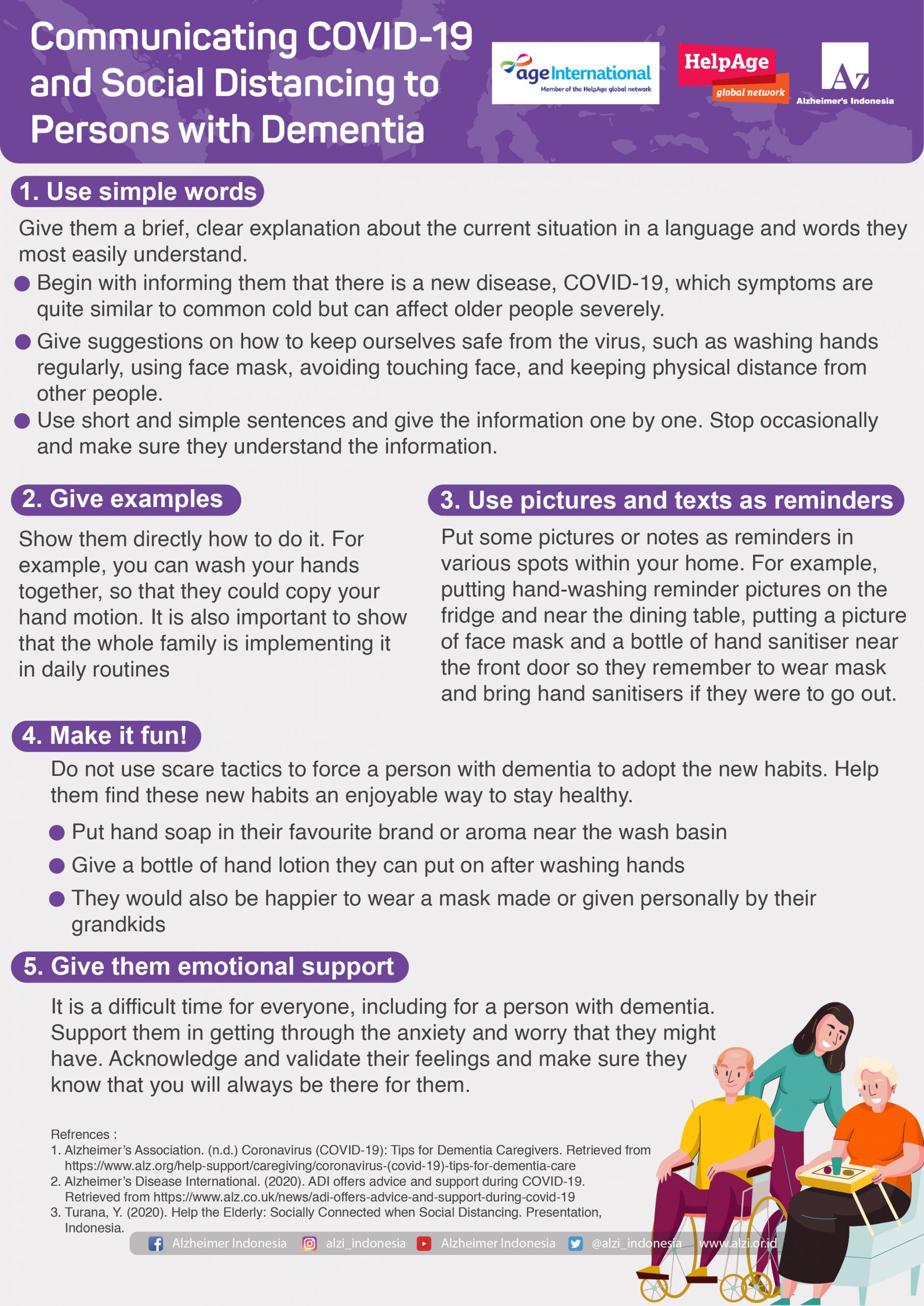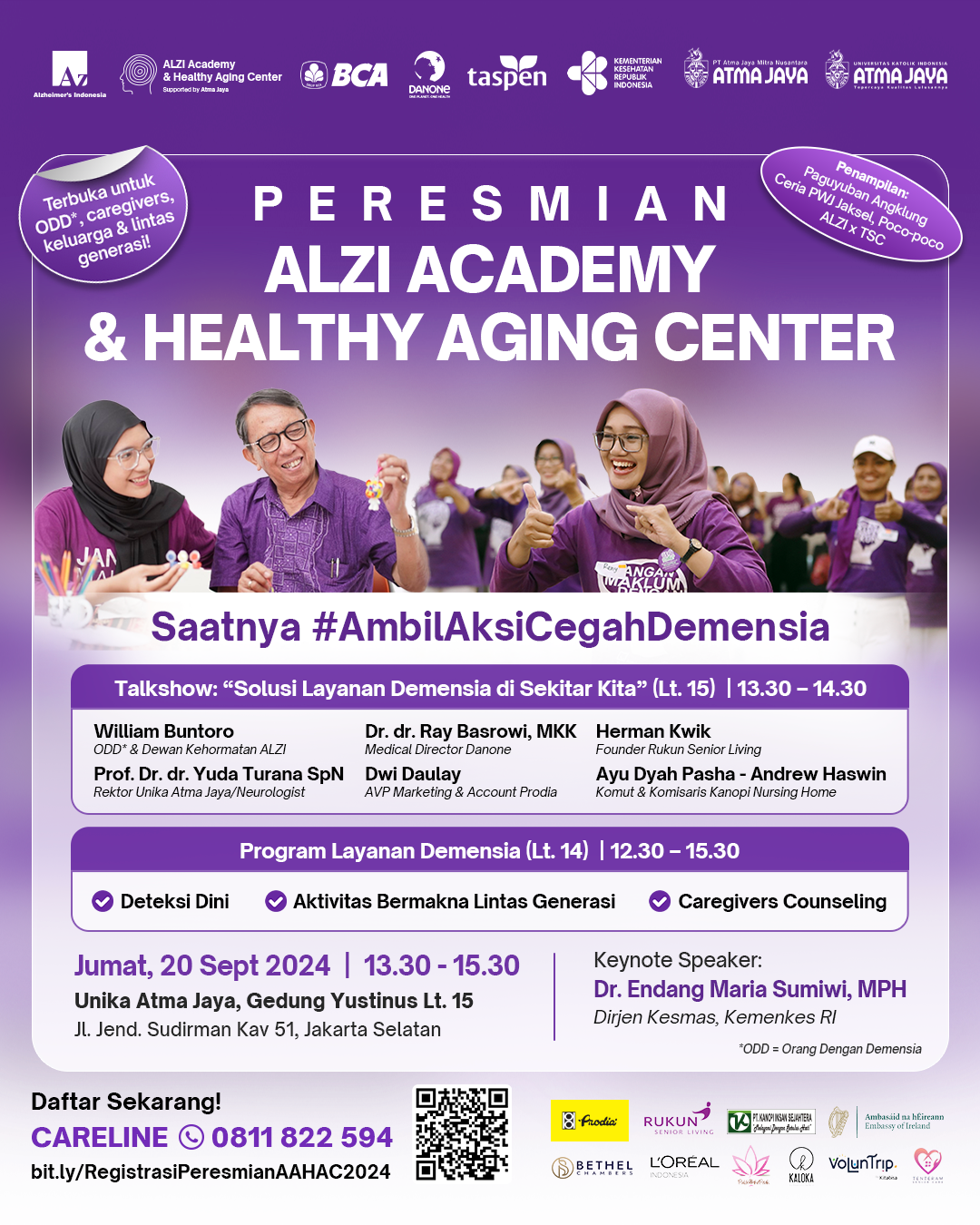
Author : Virginia Geraldine Hanny Prasetya, S.Psi
Editor : Tara Puspitarini Sani, MD, MSc (Dementia)
There is a higher risk for older people to be affected more severely by COVID-19 and to have a worse outcome, especially those with comorbidities such as diabetes and high blood pressure. However, some people who are infected, especially young and healthy individuals, might show only mild symptoms or even no symptoms at all. Therefore, it is essential for every individual to understand and implement preventative measures, including a person with dementia.
Older people living with dementia have an even bigger risk than healthy older people to be infected by COVID-19. Dementia interferes with a person’s cognitive functions, including the ability to store and retain new information, understanding conversation, reasonings or even resulting in changed behaviour and unstable emotion. They may experience difficulties to understand the reasons behind the new habits they have to adopt, such as why they could not go out and meet people, why they have to use a mask, etc. Hence, we have to adjust our approach so that we can communicate effectively with a person with dementia. If you have a family member who is living with dementia, here are some advice in communicating COVID-19 information to a person with dementia.
- Use simple words.
Give them a clear and simple explanation about the current situation in a language they are most familiar with. We can begin with informing them that there is a new disease, COVID-19, which symptoms are quite similar to common cold, spreading in the community all over the world. Older people can get infected very easily. After that, we can give them some suggestions on how to keep ourselves safe from the virus, such as washing hands regularly, using face mask, avoiding touching face, and keeping physical distance from other people. Use short and simple sentences and give the information one by one. We can also stop occasionally and make sure they fully understand the information so far.
- Give examples
To help a person with dementia understanding our message regarding preventative measures better, we can also show them directly. For example, we can ask them to wash hands together, so that they could copy your hand motion. It is also important for us to show that the whole family is implementing it in daily routines.
- Put reminders
You could put some pictures or post-it notes as reminders in various spots within your home. For example, you can put hand-washing reminders on the fridge and near the dining table to remind them to wash hands before eating something, or on the mirror in their bedroom closet so they remember to wash hands before touching their face. You could also put a picture of face mask and a bottle of hand sanitiser near the front door so they remember to wear mask and bring hand sanitisers if they were to go out.
- Make it fun!
Do not use scare tactics to force a person with dementia to do adopt
the new habits. Help them find these new habits an enjoyable way to stay healthy. For example, we can provide them witha certain hand soap or hand sanitizer with a specific brand or aroma that they love. Prepare a bottle of hand lotion in theirfavourite aroma which they can put on after washing hands. They would also be happier to wear a mask made or given by their grandchild. Creativity is important to help a person with dementia find enjoyable activities at home. You can also read our other article about intergenerational activity ideas at home.
- Give them emotional support
It is a difficult time for everyone, including for a person with dementia. Support them in getting through the anxiety and worry that they might have. Acknowledge and validate their feelings and make sure they know that you will always be there for them.
References:
- Alzheimer’s Association. (n.d.) Coronavirus (COVID-19): Tips for Dementia Caregivers.Retrieved from https://www.alz.org/help-support/caregiving/coronavirus-(covid-19)-tips-for-dementia-care
- Alzheimer’s Disease International. (2020). ADI offers advice and support during COVID-19. Retrieved from https://www.alz.co.uk/news/adi-offers-advice-and-support-during-covid-19
- Turana, Y. (2020). Help the Elderly: Socially Connected when Social Distancing. Presentation, Indonesia.
About the author:
Virginia Geraldine Hanny Prasetya, S.Psi graduated from Atma Jaya Catholic University of Indonesia with a Bachelor in Psychology. She is a research assistant and a facilitator for a group cognitive stimulation therapy programme run by Atma Jaya for older people.


